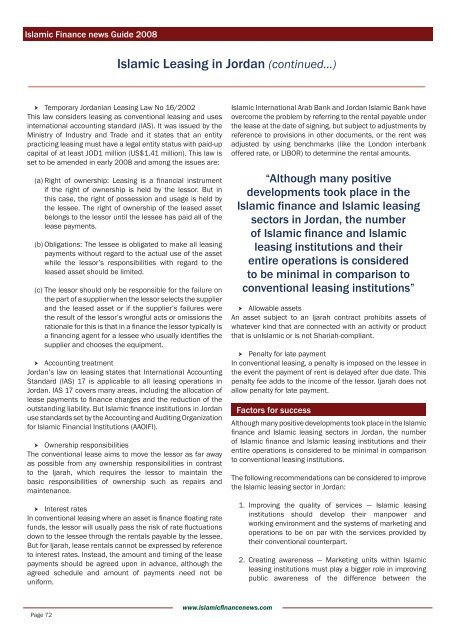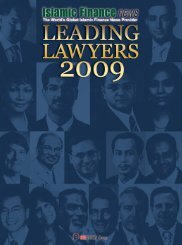You also want an ePaper? Increase the reach of your titles
YUMPU automatically turns print PDFs into web optimized ePapers that Google loves.
<strong>Islamic</strong> <strong>Finance</strong> news Guide 2008<br />
Page 72<br />
<strong>Islamic</strong> Leasing in Jordan (<strong>continued</strong>...)<br />
Temporary Jordanian Leasing Law No 16/2002<br />
This law considers leasing as conventional leasing and uses<br />
international accounting standard (IAS). It was issued by the<br />
Ministry of Industry and Trade and it states that an entity<br />
practicing leasing must have a legal entity status with paid-up<br />
capital of at least JOD1 million (US$1.41 million). This law is<br />
set to be amended in early 2008 and among the issues are:<br />
(a) Right of ownership: Leasing is a fi nancial instrument<br />
if the right of ownership is held by the lessor. But in<br />
this case, the right of possession and usage is held by<br />
the lessee. The right of ownership of the leased asset<br />
belongs to the lessor until the lessee has paid all of the<br />
lease payments.<br />
(b) Obligations: The lessee is obligated to make all leasing<br />
payments without regard to the actual use of the asset<br />
while the lessor’s responsibilities with regard to the<br />
leased asset should be limited.<br />
(c) The lessor should only be responsible for the failure on<br />
the part of a supplier when the lessor selects the supplier<br />
and the leased asset or if the supplier’s failures were<br />
the result of the lessor’s wrongful acts or omissions the<br />
rationale for this is that in a fi nance the lessor typically is<br />
a fi nancing agent for a lessee who usually identifi es the<br />
supplier and chooses the equipment.<br />
Accounting treatment<br />
Jordan’s law on leasing states that International Accounting<br />
Standard (IAS) 17 is applicable to all leasing operations in<br />
Jordan. IAS 17 covers many areas, including the allocation of<br />
lease payments to fi nance charges and the reduction of the<br />
outstanding liability. But <strong>Islamic</strong> fi nance institutions in Jordan<br />
use standards set by the Accounting and Auditing Organization<br />
for <strong>Islamic</strong> Financial Institutions (AAOIFI).<br />
Ownership responsibilities<br />
The conventional lease aims to move the lessor as far away<br />
as possible from any ownership responsibilities in contrast<br />
to the Ijarah, which requires the lessor to maintain the<br />
basic responsibilities of ownership such as repairs and<br />
maintenance.<br />
Interest rates<br />
In conventional leasing where an asset is fi nance fl oating rate<br />
funds, the lessor will usually pass the risk of rate fl uctuations<br />
down to the lessee through the rentals payable by the lessee.<br />
But for Ijarah, lease rentals cannot be expressed by reference<br />
to interest rates. Instead, the amount and timing of the lease<br />
payments should be agreed upon in advance, although the<br />
agreed schedule and amount of payments need not be<br />
uniform.<br />
www.islamicfi nancenews.com<br />
<strong>Islamic</strong> International Arab Bank and Jordan <strong>Islamic</strong> Bank have<br />
overcome the problem by referring to the rental payable under<br />
the lease at the date of signing, but subject to adjustments by<br />
reference to provisions in other documents, or the rent was<br />
adjusted by using benchmarks (like the London interbank<br />
offered rate, or LIBOR) to determine the rental amounts.<br />
“Although many positive<br />
developments took place in the<br />
<strong>Islamic</strong> fi nance and <strong>Islamic</strong> leasing<br />
sectors in Jordan, the number<br />
of <strong>Islamic</strong> fi nance and <strong>Islamic</strong><br />
leasing institutions and their<br />
entire operations is considered<br />
to be minimal in comparison to<br />
conventional leasing institutions”<br />
Allowable assets<br />
An asset subject to an Ijarah contract prohibits assets of<br />
whatever kind that are connected with an activity or product<br />
that is un<strong>Islamic</strong> or is not Shariah-compliant.<br />
Penalty for late payment<br />
In conventional leasing, a penalty is imposed on the lessee in<br />
the event the payment of rent is delayed after due date. This<br />
penalty fee adds to the income of the lessor. Ijarah does not<br />
allow penalty for late payment.<br />
Factors for success<br />
Although many positive developments took place in the <strong>Islamic</strong><br />
fi nance and <strong>Islamic</strong> leasing sectors in Jordan, the number<br />
of <strong>Islamic</strong> fi nance and <strong>Islamic</strong> leasing institutions and their<br />
entire operations is considered to be minimal in comparison<br />
to conventional leasing institutions.<br />
The following recommendations can be considered to improve<br />
the <strong>Islamic</strong> leasing sector in Jordan:<br />
1. Improving the quality of services — <strong>Islamic</strong> leasing<br />
institutions should develop their manpower and<br />
working environment and the systems of marketing and<br />
operations to be on par with the services provided by<br />
their conventional counterpart.<br />
2. Creating awareness — Marketing units within <strong>Islamic</strong><br />
leasing institutions must play a bigger role in improving<br />
public awareness of the difference between the

















